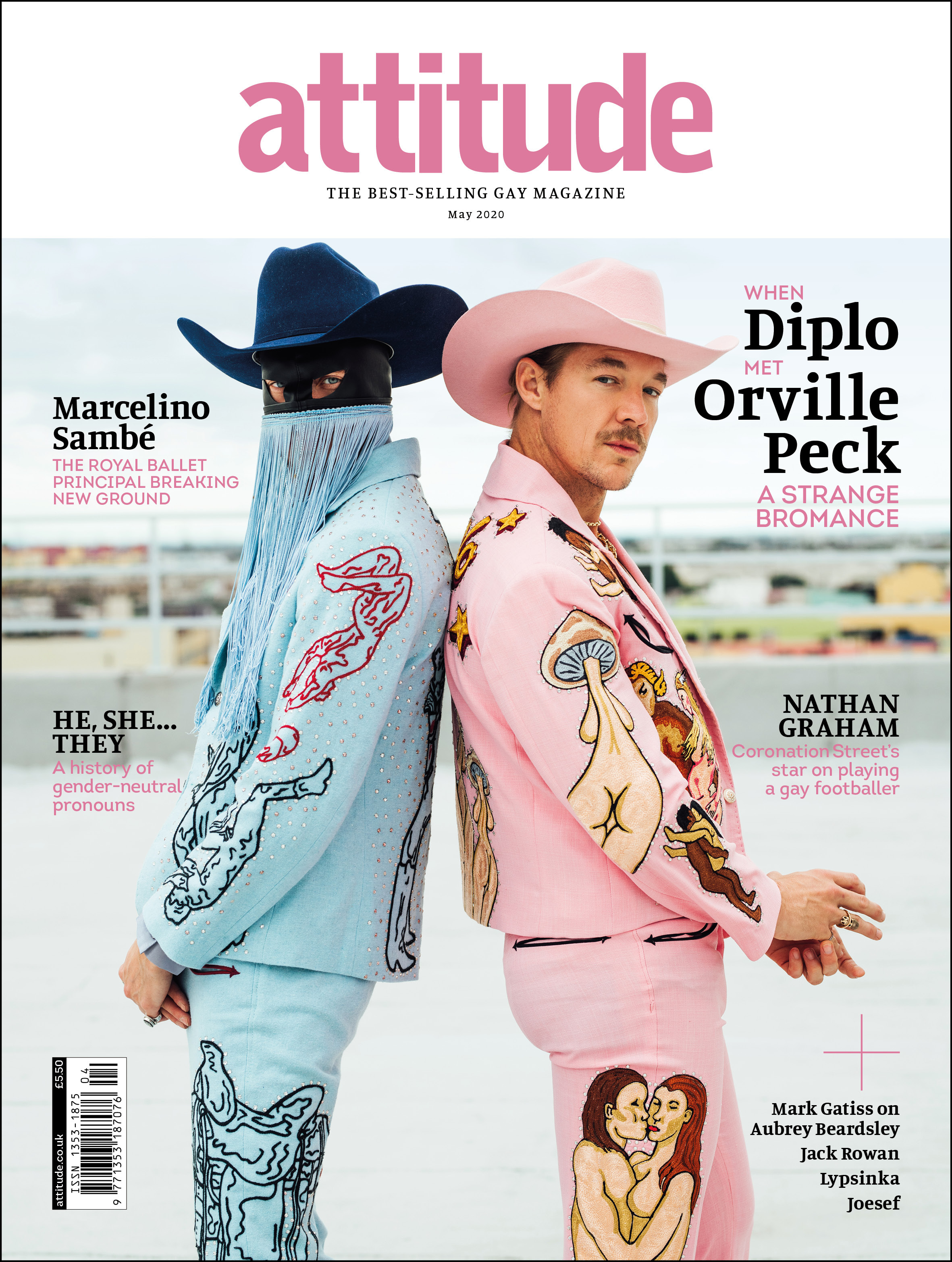Orville Peck and Diplo on cowboys, queer culture, and their special bond
The masked country singer and superstar DJ tell Cliff Joannou why country music is an inherently queer genre.
By Will Stroude
This article was first published in Attitude 321, May 2020
Words: Cliff Joannou
Photography: Taylor Miller
It’s an unusually grey day in Los Angeles, with the sun teasing us as it peeks out behind the clouds. We’re on the seventh floor of a Downtown block in a studio waiting for DJ and producer Diplo, who is running late for his cover shoot. It’s not an odd situation (traffic can be hell), but we’re on a tight turnaround as he has to leave promptly at 1pm to catch a flight to Las Vegas for his weekly residency.
Our second cover star Orville Peck is arriving a little later, but he too is on an equally mad schedule, having just wrapped a video shoot the day before, and moved home today before taking off again to go on a national tour.
Diplo, aka Wes to his friends, is all smiles when he arrives, although there’s a definite glint of a late night in his eye. It turns out he was DJing until 3am the night before at some party, which we’re guessing carried on well beyond the time his set was due to end. We wouldn’t expect anything less, really.
He dives straight in, throwing on clothes that are handed to him. This is the DJ and producer at play, trying on different personas and playing with his image as he’s famed for doing — and he’s quite happy to strip it all off to flash a torso and a pair of incredibly toned legs. Diplo knows his market.
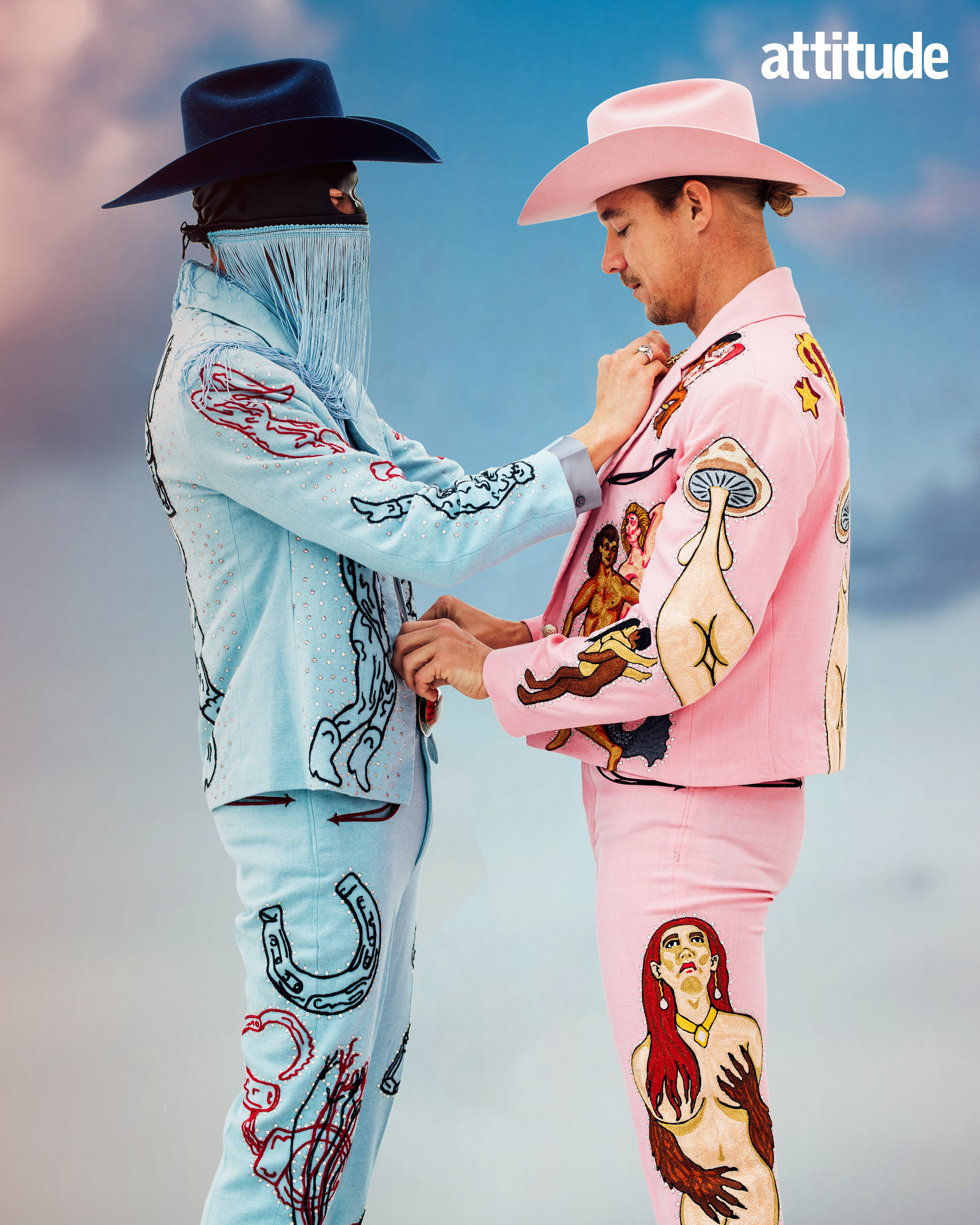
Diplo wears suit by Union Western Clothing, tank top by DSquared2, accessories and jewellery throughout Diplo’s own. Orville wears suit by Union Western Clothing, shirt by ASOS, accessories and jewellery throughout, Orville’s own
The second Orville walks through the door they bounce off each other like manic kids on a play date. Orville excitedly hands Diplo a gift of a ring featuring his now infamous masked face and they plunge into chatter as they catch up. It’s like herding cats, attempting to hurry them along so we can get them photographed, interviewed and back on their merry way. An impromptu TikTok routine doesn’t help the situation.
The foundations for music’s most unlikely friendship were laid when Diplo slid into Peck’s DMs last year, to find he already had a message from Orville waiting.
“We actually did meet before that, on a tour bus in Miami or Vancouver,” Diplo says. “15 years ago when I toured with a punk band.”
“Mika Miko,” Orville recollects.
“It was like a punk band and DJ mash-up tour. So he’s right. I think he also dabbled in punk.”
“I’ve played in bands before,” Orville says. “But that’s what I like about Wes, I think we’re similar in that we both like so much different stuff.”
“I’m older than him, but we’re a generation of people that grew up with hip-hop, house music, dance music, DJ culture, punk,” adds Diplo. “I grew up listening [to] and loving punk and hardcore, and country [music] was always in my world. But Orville puts me under so much intense older references. The guy is like an encyclopaedia for everything Americana. That’s inspirational.”
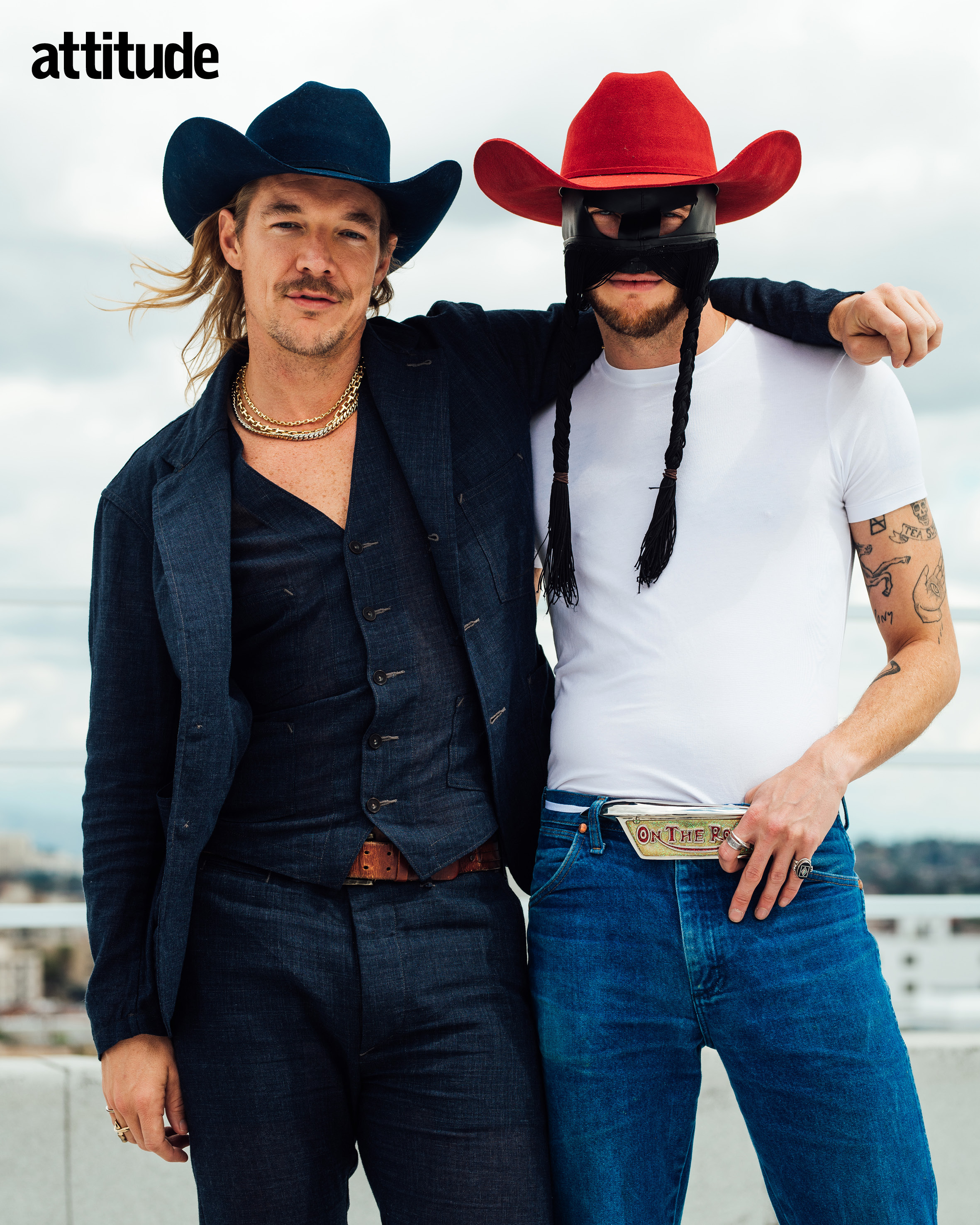
Diplo wears suit jacket, waistcoat and jeans, all by RRL Orville wears top, by Prada at Matches Fashion, jeans, by Wrangler
Theirs is a peculiar bromance.
One is a hitmaker who has worked with any pop artist that matters, from Beyoncé to Ariana Grande via Britney Spears. Beyond his more well-known moniker, Diplo has churned out a series of hits under his other aliases: Silk City (alongside Mark Ronson, releasing Electricity with Dua Lipa); Jack Ü (Justin Bieber’s career-defining Where Are Ü Now with Skrillex); and, most notably, Major Lazer (alongside Switch) that delivered the smash Lean On, Spotify’s ‘Most Streamed Song of All Time’ at over 800 million streams to date, while the video has become one of YouTube’s biggest ever, currently clocking in at over 2.7 billion views. Now Diplo’s getting ready to add country music to that list with his first album for a major music label, to be released under his real name: Thomas Wesley Pentz.
Although other DJs of his status tend to fall into a rut and hit repeat on their productions, 12 years after his breakthrough hit with M.I.A. on Paper Planes, it’s testament to Diplo’s talent that he’s still knocking out quality records. Even more rare, is for a DJ and producer to maintain a credible profile alongside a prominent celebrity image. Diplo has negotiated his fair share of mishaps — inadvertently picking a fight with Taylor Swift fans wasn’t a high point (his Twitter is now managed for him), and the days when his Instagram feed was filled with hot chick pics are long gone.
The flipside of this rather bizarre pairing is Orville, the masked country singer-songwriter who blends an unapologetically queer aesthetic with a genre that is not renowned for being overtly LGBTQ-inclusive. Peck entered the picture rather sublimely a year ago, letting his music speak beyond the mystery as the rather excellent debut album Pony went on to garner critical praise, becoming the sleeper hit of 2019. His landmark year culminated in Peck being one of the most in-demand artists on the red carpet at the Grammys.
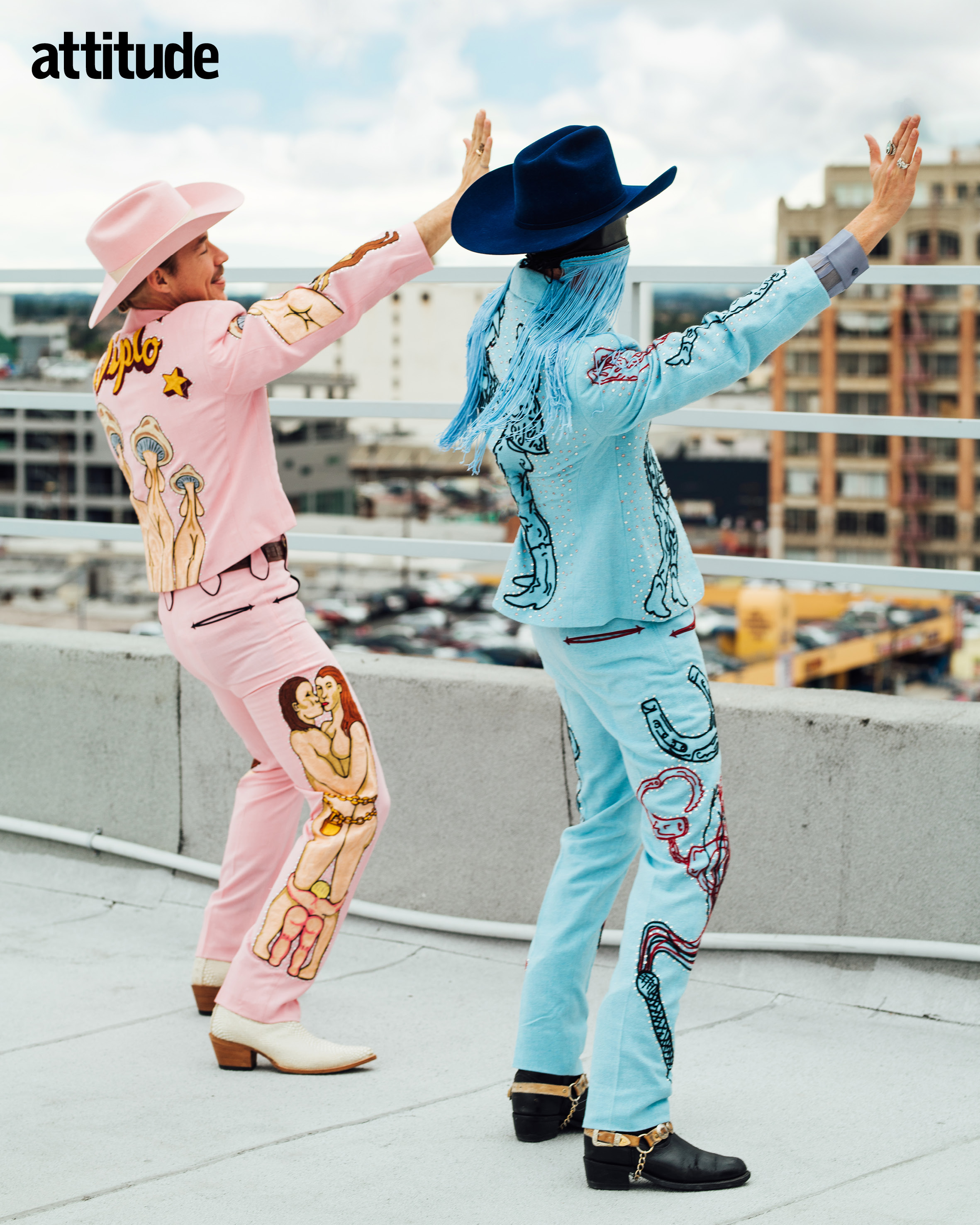
Diplo wears suit by Union Western Clothing, tank top by DSquared2, accessories and jewellery throughout Diplo’s own. Orville wears suit by Union Western Clothing, shirt by ASOS, accessories and jewellery throughout, Orville’s own
Where Diplo might court celebrity, Peck hides his face in order to reveal his truths, although he is adamant that the mask is not to be misconstrued as a character or persona. “The stories in my songs, the emotions, everything about my art, is deeply personal,” says Peck. “The heightened visual aesthetic I use to portray myself is not to fabricate a mystery; it’s simply me following in a long lineage of country and western stars, who wore bold outfits and crafted incredible stories, all of which they built alongside sincerity. My only agenda is sincerity.
“I have worked as an artist my entire life, and traversing this industry as a gay country musician, I already endure daily hate, bullying, aggression, and people actively trying to discredit what I do. So whether or not Orville was the name I was born with is irrelevant. I understand there is a temptation to try and unmask what I do, but to do so would be to miss the point entirely. I love nothing more than to talk candidly about my art and music and the way that it connects with my fans from every walk of life. All I ask is that people respect my work — and more importantly — my fans enough to maintain this crucial part of my expression as an artist.”
Beyond the music, what do you connect on?
O: I always joke that I text Wes more than I text my friends, really.
D: He’s probably the person I text most.
O: The thing I really like about Wes is his sense of humour. My kind of sense of humour is pretty silly. And I think Wes is similar. We’re usually making fun of pop culture or things like that.
D: We’re very self-aware. He’s like my long-lost brother.
O: Yeah, it’s nice.
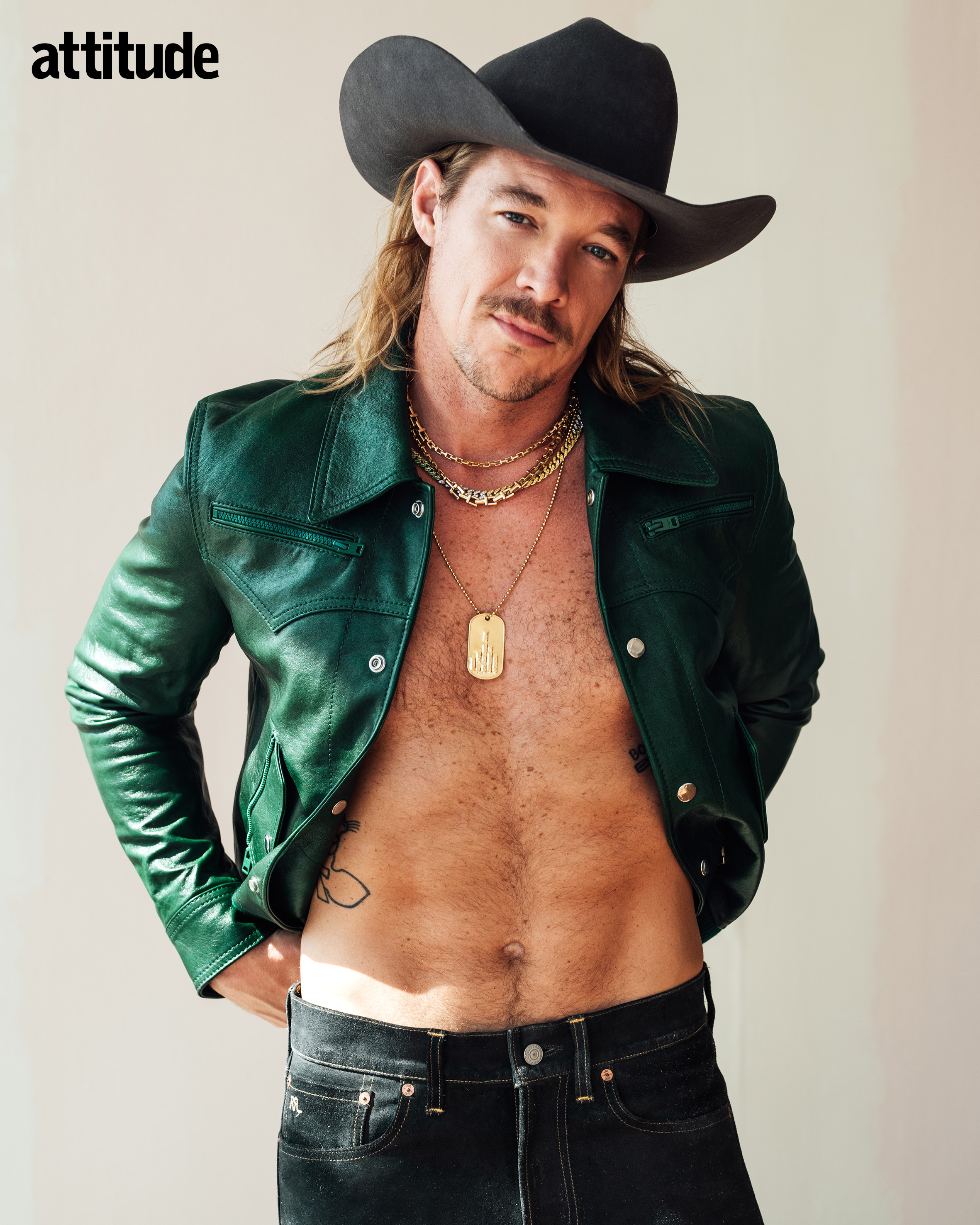
Diplo wears leather jacket, by Coach, denim, by RRL
You recently collaborated musically. I guess it was inevitable that would be part of your relationship. How was the process?
D: When I saw him pushing the envelope, I’m not sure if you were accepted in country music, [but] you didn’t care about it. You were on your own wave the whole time. I was like, ‘Damn, I love that.’ He forced his way in. Now, everybody is paying attention. When we went to the Grammys together and I was trying to be Tanya Tucker or whatever, everybody was just pushing me out the way to get to him. I realised right then his impact was really big.
The combination of those two aesthetics, the cowboy thing and the queer thing, was quite inspired, but what made it work is that the music is actually really good. What intrigued you about bringing them together?
O: Well, I think for me the two are intrinsically connected. Like Wes said, I really pride myself on my music history and I am a country music nerd. My favourite thing to do is to talk about obscure artists and things like that, because I just genuinely love country music. For me the two things seem really normal to me. First of all, my only agenda is to be as sincere as possible. Sincerity is kind of a prerequisite of country music. When I sing about men or relationships I’ve had with men, that’s just because that’s my truth and that’s my experience. In that way, I’m just doing exactly what other country artists I respect have done, which is just tell the truth. They call it like three chords and the truth. Of course, I play on the pastiche of over-the-top cowboy imagery because a lot of that comes from spaghetti westerns, which were directed by super-gay Italian directors in the ’50s. So there’s loads of homoeroticism built into cowboy culture because of that, because a lot of cowboy culture now is based off those motifs, which are inherently gay. I would argue that what I’m doing is actually just more succinctly revealing what’s already there. If you go to any gay bar in the world, there’s going to be somebody in a cowboy hat. The two things are not far from each other.
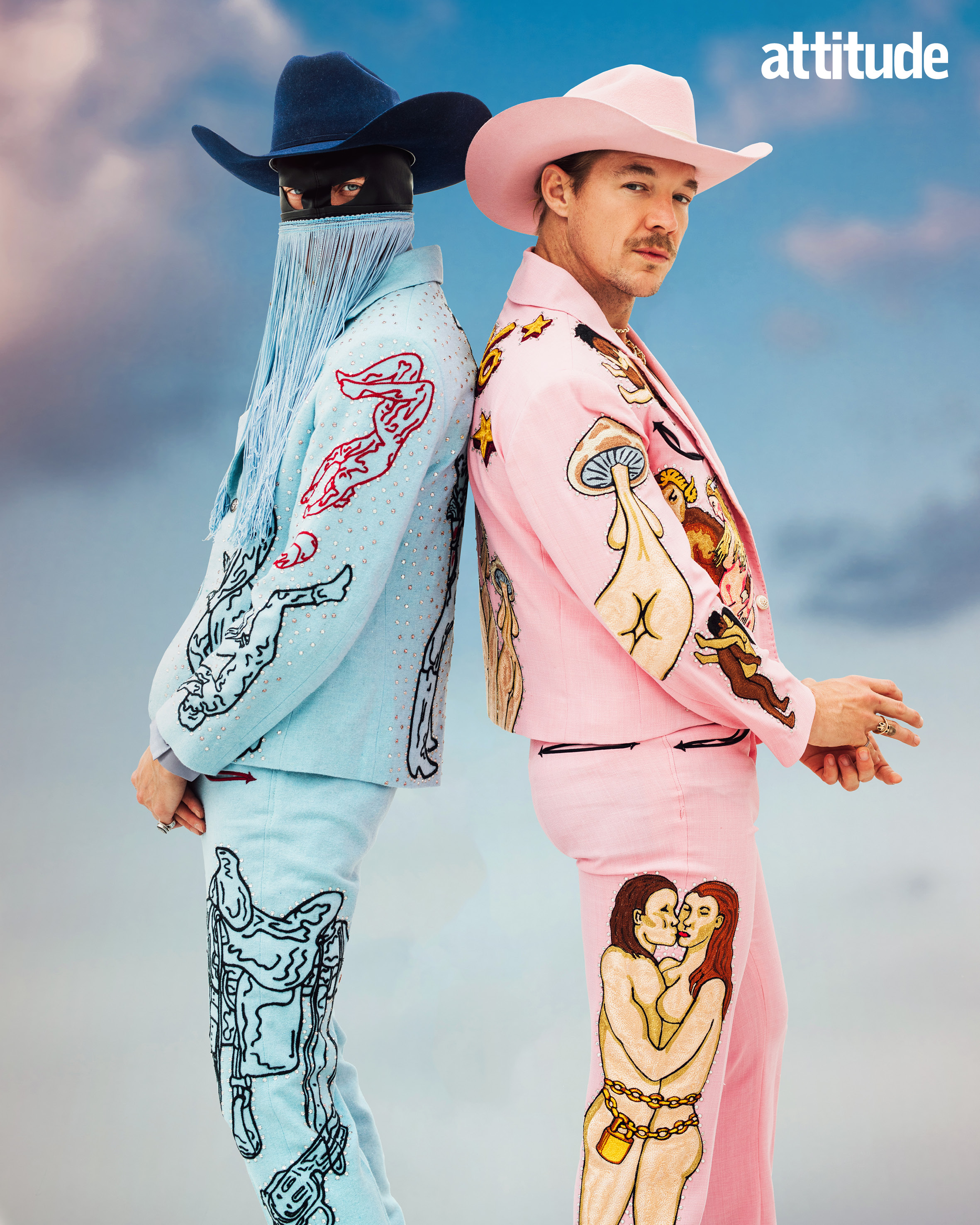
Diplo wears suit by Union Western Clothing, tank top by DSquared2, accessories and jewellery throughout Diplo’s own. Orville wears suit by Union Western Clothing, shirt by ASOS, accessories and jewellery throughout, Orville’s own
When you watch your music videos, it feels natural. It doesn’t feel like they’re forced together.
D: No, and also the songwriting doesn’t feel forced, either. It feels like it could be for anybody. The songwriting could be for anyone… But that’s what a good song is, it’s not about the relationship aspects, it’s just about the love. I think that’s what he does the best.
I guess for some years as gay people we have always put ourselves into songs often written or performed by straight people, and this is about flipping that.
O: I grew up listening to a lot of Patsy Cline and stuff like that. When I was younger, I listened to mostly straight artists. I think it would have been nice to have had some gay country artists when I was a kid to kind of relate to.
What attracted you to the country music genre?
D: I’ll be really honest. For me, it was kind of like a joke to sign a deal with Columbia. But I was working on these sorts of ideas and I just wanted to dress in cowboy hats. And then I was like, wow, this is something I’m going to do. I’m just going to go there and do the music. I feel like it might be hard for my audience to understand it, but I just don’t give a fuck. Artists like Herbie Hancock, David Bowie or even Trent Reznor changed their sound. That’s what we do. If you love music, you just always move forward. You find different ways to do it.
O: And that’s what makes you such a true cowboy. The reality is Wes is one of the biggest cowboys I’ve ever met, because I think he’s unafraid to do what he wants to do no matter what anyone says or thinks. And that’s like the most cowboy attitude you could ever have. Like, basically what I’m trying to say in my music.
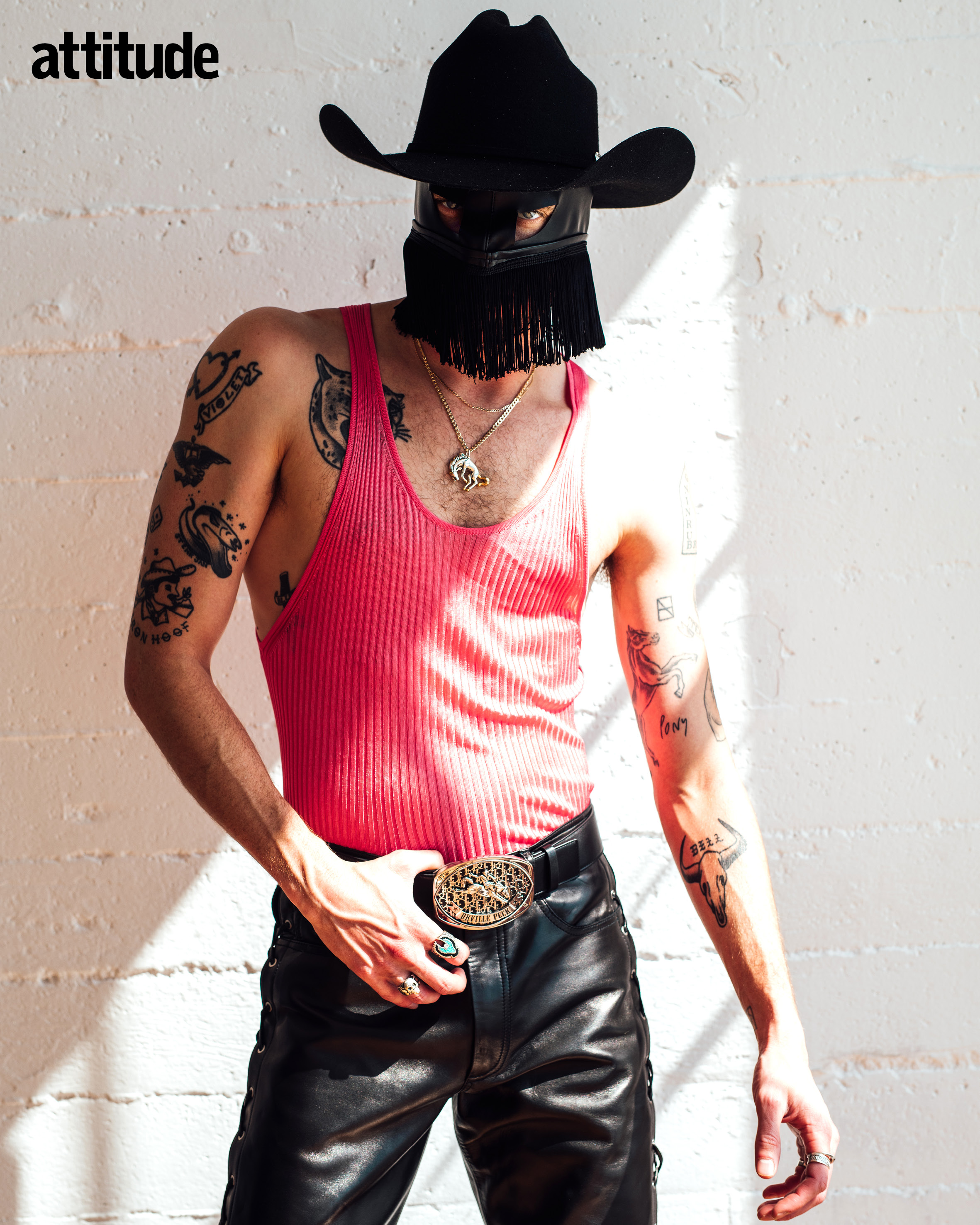
Orville wears tank top by Dior, leather trousers by Versace
I guess that’s probably the perfect definition of what a ‘cowboy’ is. Being rogue and going solo.
O: I think so. My mom’s a cowboy. I don’t think she’s ever worn a cowboy hat in her life, but she’s a badass.
D: Yeah. There’s a level of fearlessness you’ve got to do if you’re out there…
Maybe that’s why queer people relate to that cowboy aesthetic, it’s the fearlessness. There’s a sense of being alone and isolated. But there’s also a sense of being kind of bold and in this vast epic landscape of a wild world.
O: I’m surprised more gay people don’t feel connected to country music. And that’s mostly because of the stigma that country music as an establishment has kind of pushed. But it makes total sense to me that someone like Dolly Parton is a queer icon because she’s someone who had to really blaze her own trail and be her own. She’s basically a drag queen. The thing that I connected with country music when I was a kid is it’s about isolation, heartbreak, disappointment. That’s the gay experience for everyone at some point. I feel like that music is written for people who feel like the minority or feel somehow alienated. Somehow the stigma got twisted around where it’s like, oh this music is for well-adjusted, straight white men or whatever. And I actually disagree. I think that it’s meant to be for people who feel like freaks.
Are we going to have a collaboration between Orville Peck and Dolly Parton?
O: Maybe. Yeah.
D: That would be awesome.
Have you heard from her at all?
O: So, I haven’t heard from Dolly, but we use the same booking agent. We’re working on it.
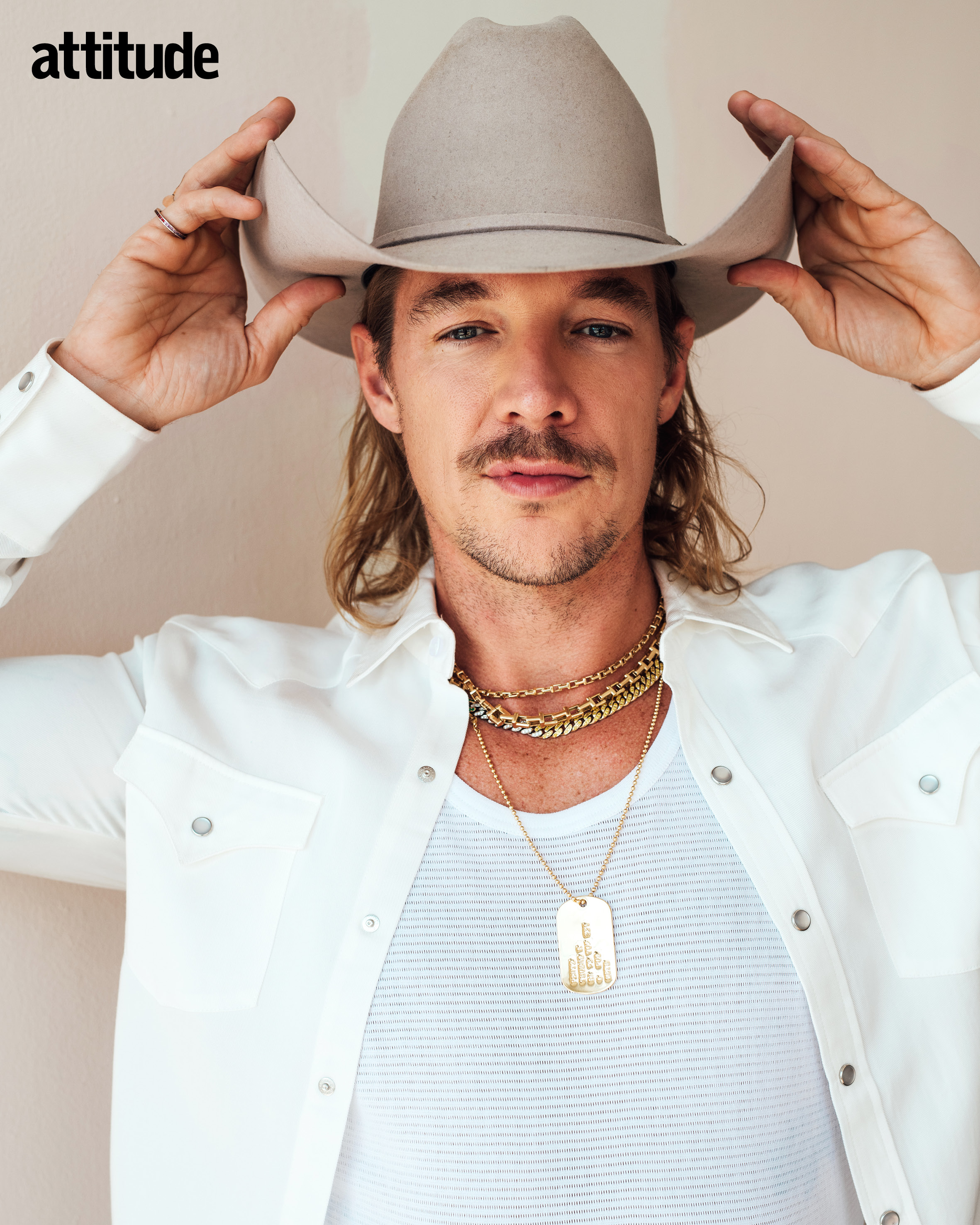
Diplo wears tank top, by Sunspel, shirt Diplo’s own
Diplo, you’re using your real name, Thomas Wesley, for this project. Why did you make the choice to use your real name now after all these aliases you have?
D: I’ve done everything independently for the past 10, 15 years and it’s so hard. It gets harder and harder that you do need a team; you need people who love what you do. And I found Orville and I both have a label boss in Ron Perry, and he loves us. I would never do a label deal unless I had someone that wants to support what I’m doing.
O: You need people who are going to champion you for real, not just have you as a trophy or whatever.
How do you respond to accusations that might arise around cultural appropriation? Both of you came to country music and formulated identities.
D: How many country artists have fake names? I think, like, 90 per cent of them have amazing names.
O: Everybody. That’s the thing. I don’t feel that I formulated anything, to be quite honest with you. I feel like I did completely the opposite. This is the most sincere I’ve ever been as a writer. I sing about things on my album that I’ve never even talked to people about. Everything I do is genuinely authentic. I’m the biggest country fan I know, and I’ve been listening to country my whole life. I’ve been obsessed with cowboys since I was five years old. To me, whether Orville Peck is the name I was born with, who gives a fuck? It’s like this for anybody in this entertainment industry.
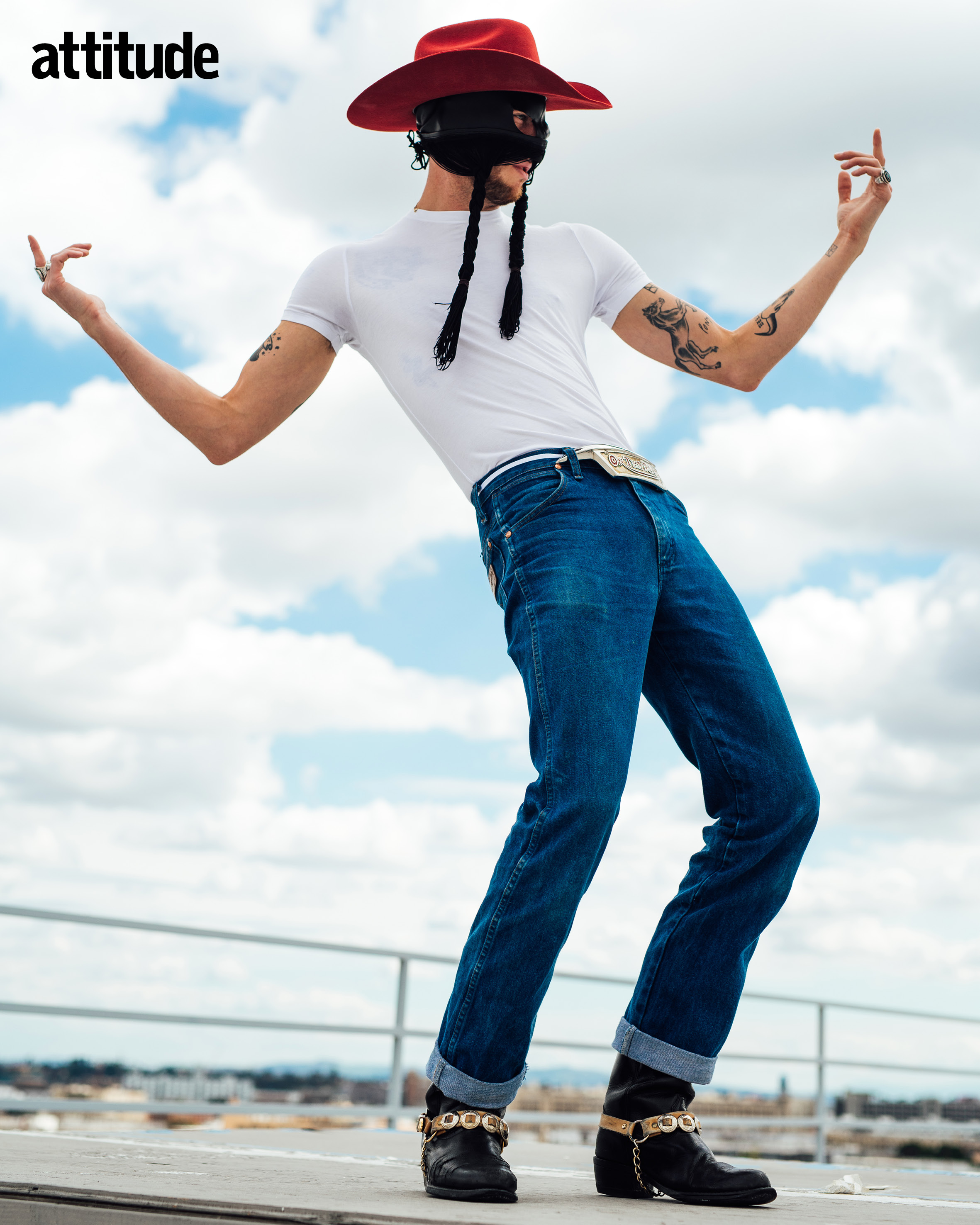
Orville wears top, by Prada at Matches Fashion, jeans, by Wrangler
I guess every artist who steps on stage, from Beyoncé to Mariah to Madonna, they become somebody else.
D: With Madonna, I feel like that’s the epitome of artists, that is the whole package. The tour she just did, like half the show is banter and you’re like, wow, that’s what a real star is.
O: People have a really finely tuned bullshit barometer now. I just don’t believe you can be successful as an artist without being sincere. If you follow Wes on Instagram, you see how he is with his humour, that’s who he is. That comes across and then if you hang out with him, what you see is what you get. But to answer your question about the culture appropriation, the thing about country music and cowboy culture is if people know anything about their history, country music and cowboy culture in general is it’s a combination of Mexican cultures, Spanish, Irish settlers, Appalachia. Cowboy culture and country music is for everyone, period. Because where it is today has had influence from so many different cultures and places. It’s available to everyone, and anybody who thinks that it’s not, doesn’t actually know what they’re talking about.
D: The West is all about stepping into the unknown. That’s what it’s always been about. From when they were crossing the Mississippi river — The West started in the US in Tennessee, because that was the frontier at one point, and now we’re all the way to California. It’s just going into the unknown. That’s what the western’s always been about. It was lawless, and that’s like a fantasy for me when I was a kid, being part of that to where I am now.
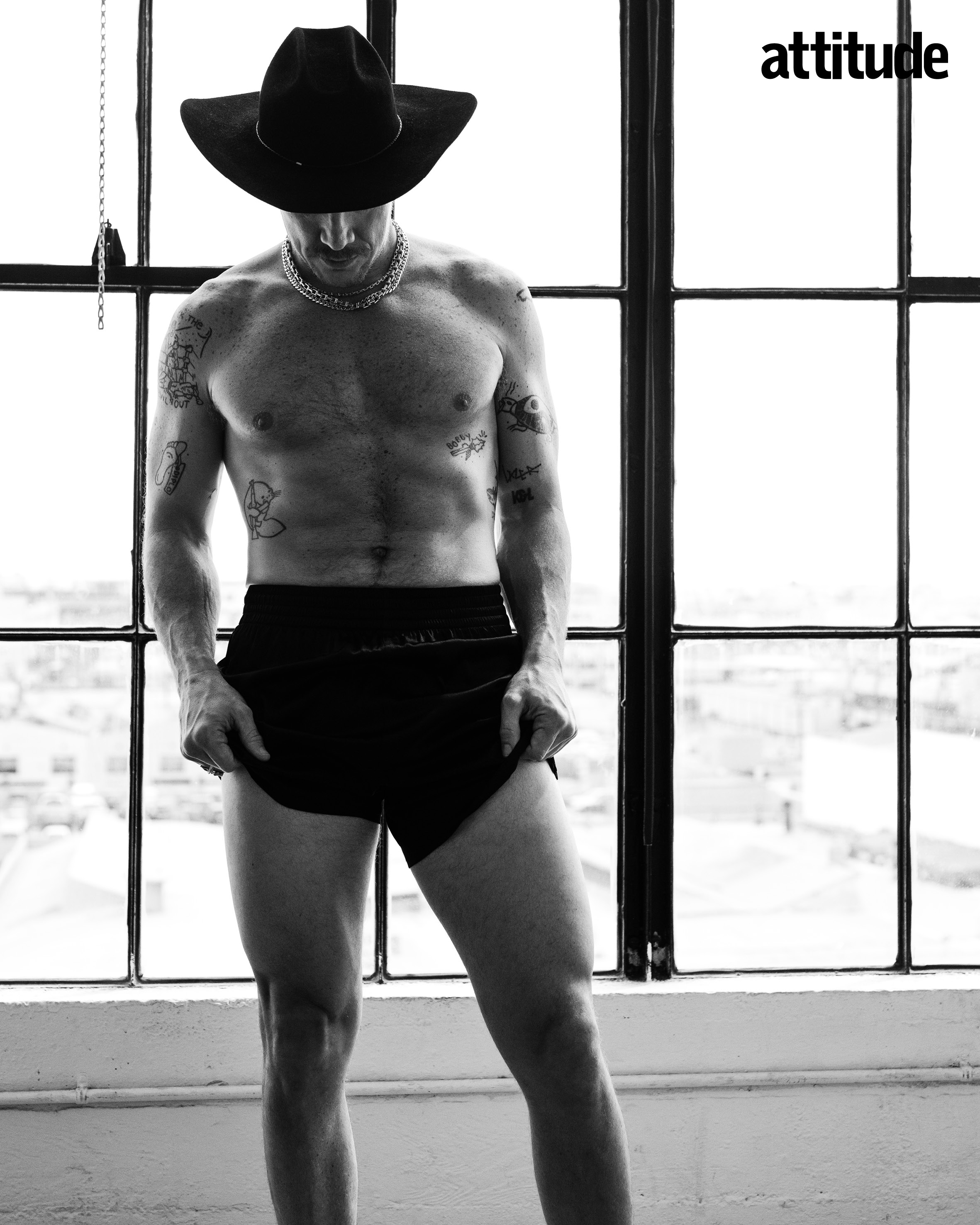
Your identities are very rooted in masculinity. How do you relate to what it means to be a man in 2020?
O: I don’t think about it very often. I’m just being genuinely sincere when I say that. The idea of gender or masculinity versus femininity, that shit doesn’t come into my brain, because I honestly just feel like I’m so beyond that at this point. I have masculine aspects to myself and I also have really feminine aspects to myself. I don’t know how to quantify those. I don’t know what that makes me. I don’t know what to call that. I just think that that stuff’s a waste of time. For me, I’m more interested in just making music.
D: I think it’s more about the human energy. When I think about queer artists over the past 30 years, it’s always been the queer artists that have changed the way music exists. The original guys who were creating hip-hop were queer, house music, Baltimore Club, New Orleans bounce music. Every time there’s a genre that falls out of nothing, it’s always been kind of like the queer scene that created that. It’s always been in the underground. It’s like Vogue that Madonna put out, and she’s always shown respect and love, but it’s always been the queer community who have to scratch it out of nothing. I think that’s back to the fearlessness because when you have that energy — the masculine energy, the feminine — you’re taking all the risks because there’s nothing to lose.
O: Fully.
D: I think it might be challenging for some straight men, but for queer artists it’s kind of second nature. They’re able to go wherever they want and, like I said, there’s no walls.
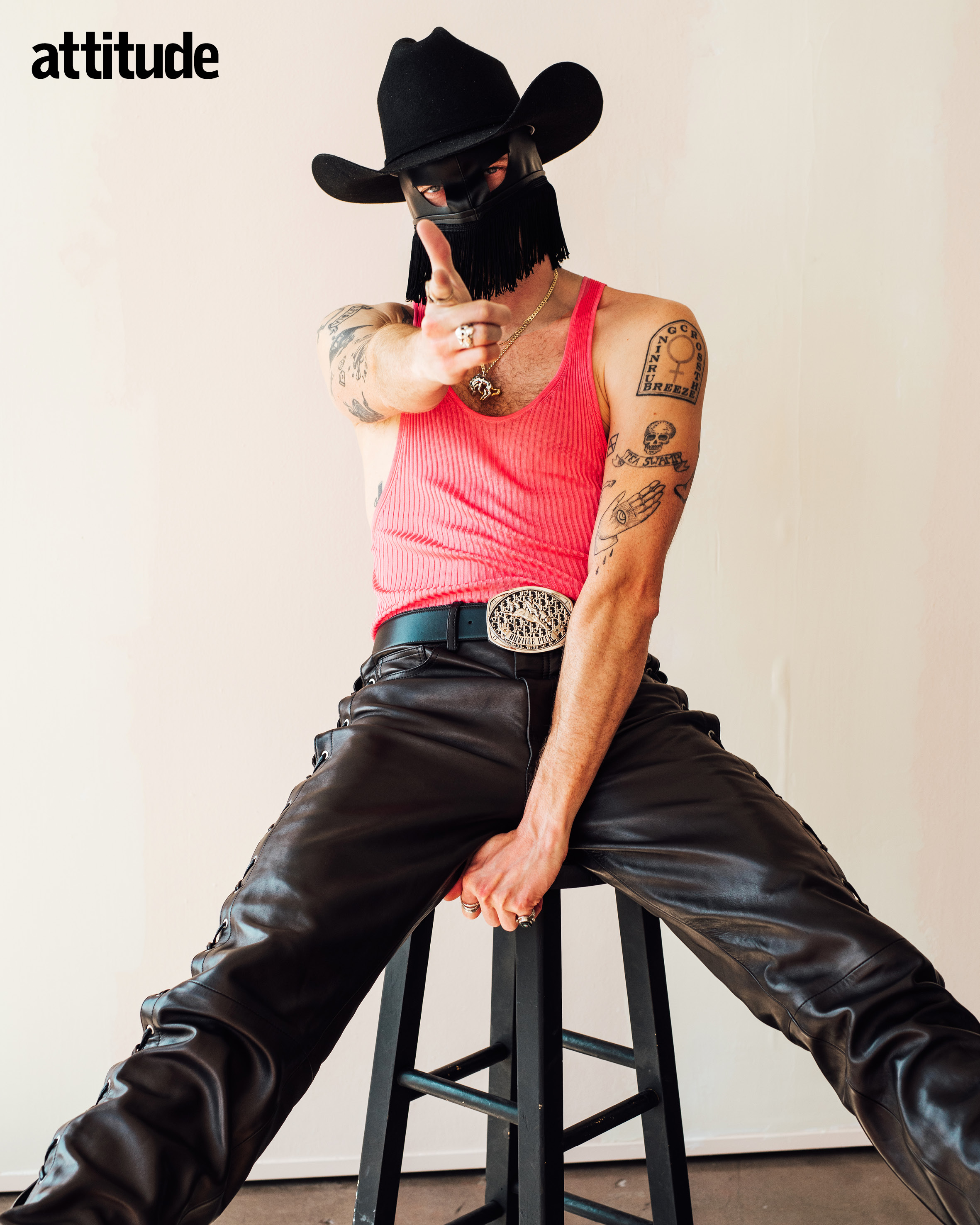
Orville wears tank top by Dior, leather trousers by Versace
There’s a lot of discussion about toxic masculinity. What does that mean to you?
D: If you can eliminate the toxic part of it, there’s nothing wrong with being masculine.
O: What makes someone masculine, what makes someone feminine? In 2020, I just don’t even, I don’t know… I just don’t give a shit. For me, I just like being around real people.
How do you balance the idea of being an artist yet also being in the celebrity world? How do you avoid veering too far down the wrong end?
D: You need thick skin, you have to have tunnel vision on what you’re doing, who you are, because you can’t listen to people here and there… It’s just like being in your movie, you have times where you’re not feeling high or low. It’s hard to be up there on stage. You’re hired to be like that. When you’re under the microscope, it’s magnified a lot for us; the experiences or the emotions of, like, 100,000 fans that are also on our shoulders.
O: Usually, the more successful and big your career gets, the smaller your personal life tends to become. You deal with way less people.
D: And make sure you have a good family. Know the people on your team, they’re going to support you through whatever.
O: Also, find other artists that you really like, and connect to them. That’s genuinely what I love about Wes, we text all the time or we hang out. It’s nice to find other people in this industry that you feel connected with, because I think there’s a lot of superficial connection and that could be misconstrued as something real.
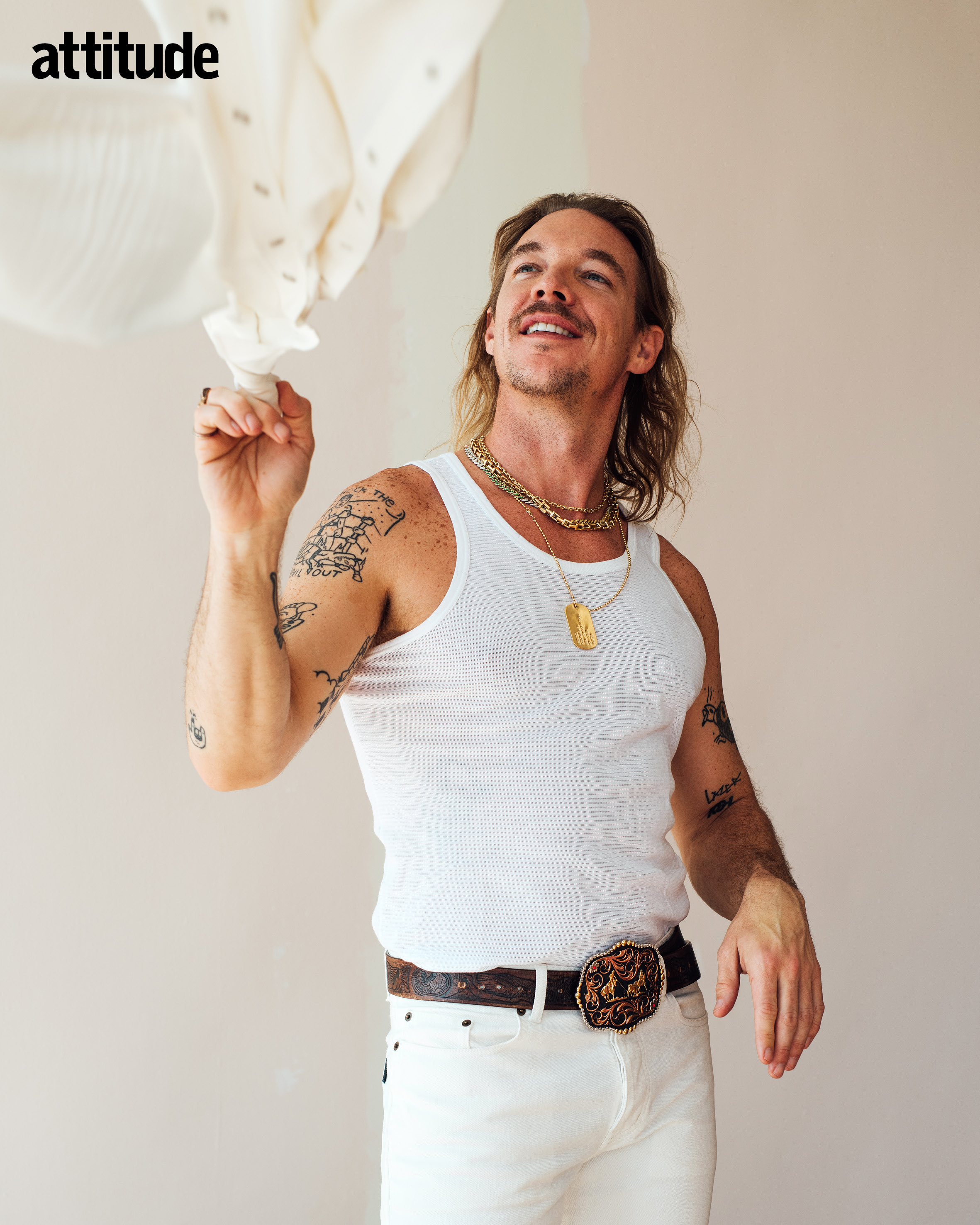
Diplo wears tank top, by Sunspel, jeans, by RRL
Diplo, you’ve spoken about your own personal growth in interviews, like from the days when you were firing off tweets to Taylor Swift’s fans.
D: I didn’t know that people actually paid attention to what I was doing. And it was embarrassing… I made mistakes. I’ve come back from them, and I learned, but I also think it’s important we go out there and put ourselves on the internet and have opinions and be able to talk about what we want to do and have conversations with people about what is happening.
O: Well, everyone else in the world is allowed the freedom to kind of make mistakes. I think sometimes in the culture now if you’re somehow in the entertainment industry or whatever you want to call it, it’s like people are very unforgiving about anything but it’s like everyone has to… I don’t know…
…calm down? Speaking of which, do you think part of Taylor Swift’s track, ‘You Need to Calm Down’ was written about you?
D: I hope it was not about me. Me and Taylor Swift are actually buddies. She’s a good friend of mine, and I see her a lot. She’s also just a country girl, so we’ve got to show some love to her. She’s also been working her ass off for a long time. She’s very strong.
O: Yeah, she’s incredible.
Orville, when confronting your sexuality, when did you realise you were different?
O: Really young. I have two older brothers who are both straight and I never had to come out to my family. I’m from a very liberal, cool, art-based kind of family. My father was a sound engineer for The Who and Suzi Quatro and loads of bands in the ‘70s. I grew up wanting to be Indiana Jones and a cowboy and the Lone Ranger and that’s all. I knew that I was gay when I was very little, and I was lucky enough to be in a family where that didn’t matter. I was more concerned with the fact that I wanted to be, like, a cowboy.
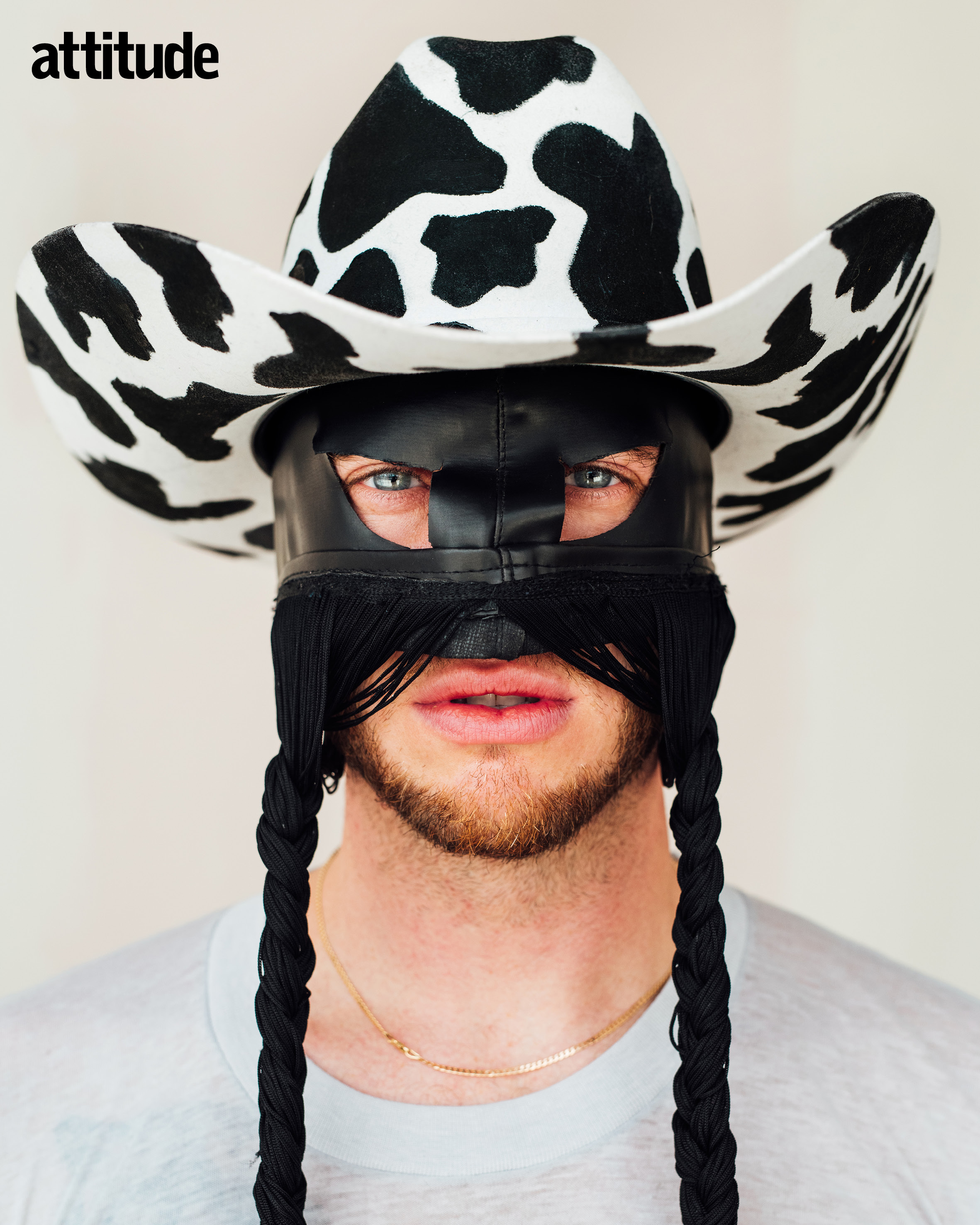
Orville wears top, Orville’s own
What experiences helped define you in life?
O: I lived in so many places, I grew up in Africa for most of my life, I’ve lived in Europe, Portugal, London, all over America, in Canada. I was lucky to be able to travel as an entertainer for many, many years and for me those are the things that really shaped me and defined me and encouraged my bravery. If I hadn’t travelled a lot, I think I would have been a closed and frightened person.
Even if you grow up in a loving environment, that sense of isolation can still creep in.
O: Totally. I mean, I still feel it to this day. It’s insane. I’m surrounded by people who love and support me. I’m the happiest I’ve ever been. I’m having the most success I’ve ever had in my life. But I still wake up on days and feel lonely and feel sad. It doesn’t really make sense on paper. It’s not even just queer people. I think it’s a lot of people. I think if you somehow feel, especially these days, if you somehow feel on the outskirts of things or you somehow feel like your perspective is kind of marginalized, I think it’s really difficult. I feel very grounded and happy, but I still carry a pretty healthy dose of loneliness and insecurity and anxiety and I think I’ll probably always have that. I had a family that was very supportive and loving, but I still grew up in a society where I didn’t see myself represented very much, and I didn’t feel that I had all the opportunities that everyone else had.
Diplo, can you relate to any of that?
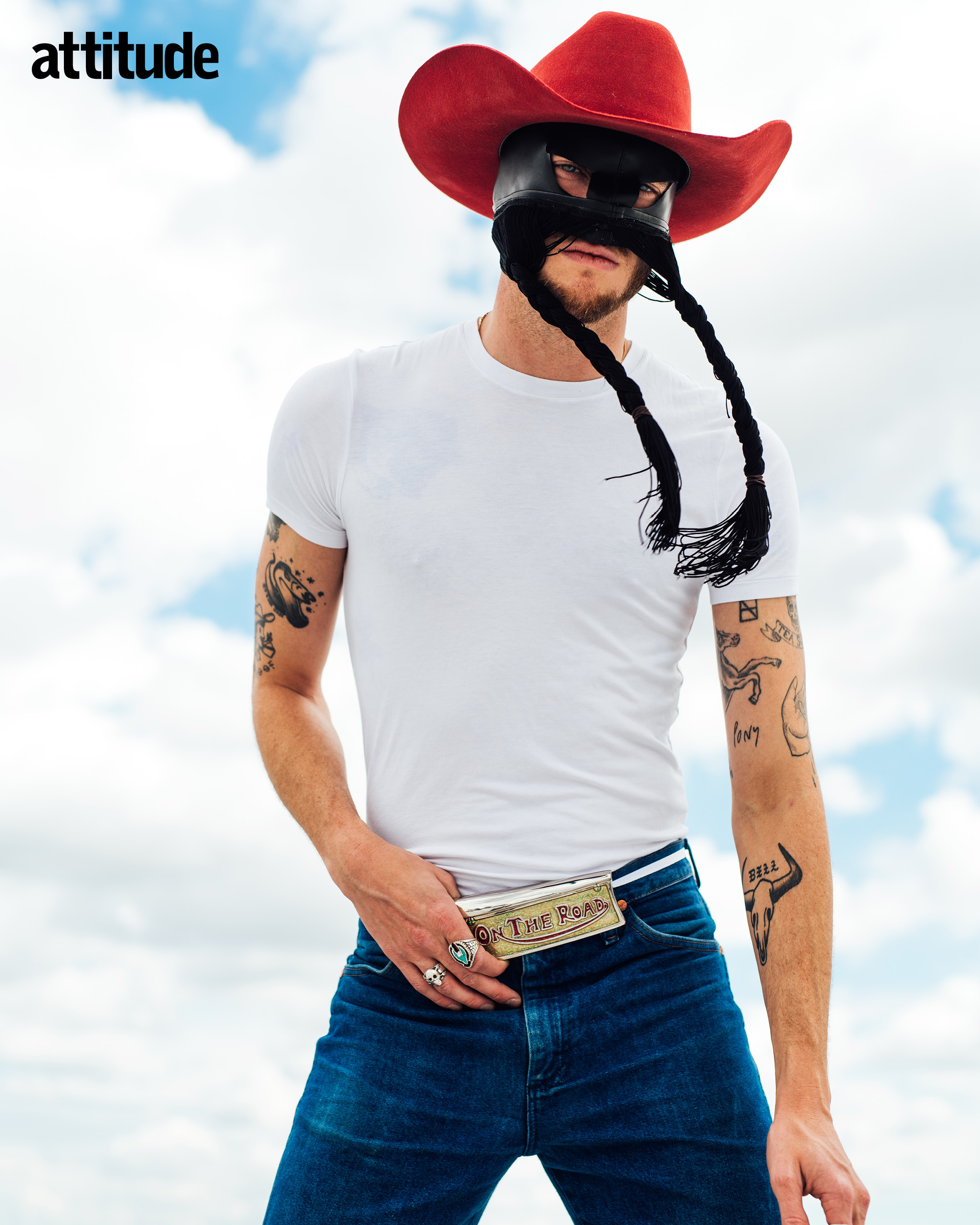
D: I think the more you have to deal with your emotions, like the heavier they are, you’re going to have a stronger sense of being a creator and creating. The people I meet that are the strongest creators, they’re always teetering on, like almost losing their minds… I’ve always found that, too, in myself. Of course I deal with loneliness. I deal with emotion all the time. I channel, I write lyrics as well for others. Some of the songs I’ve worked on, I do find it a fine line to balance how far can you go and how far do you have to go to seek help even for your problems. I think it’s something we could talk about as well. But I do find a level of emotional instability and a level of creativity being hand-in-hand.
When did you first feel accepted or have a sense of belonging related to your sexuality?
O: I feel like I have gone through times when I have felt like the only gay person in the room when I played in punk bands and I grew up as a skater. Most of my friends in life have been straight guys a lot of the time, because I grew up with those interests that seemed typically available to those people, I guess. But now I spend most of my time with drag queens and I have a lot of gay friends. I have never let it define me, I suppose. But in the same breath I’ve never shied away from it, never been ashamed of it, I don’t think there was a time in my life when I needed to hide who I was or make excuses about who I was. I was lucky enough to grow up with a feeling that that stuff was important to who I was and to be proud of, but I never allowed barriers for myself. The only time I’ve ever thought much about it is when I’ve been met with other people’s misconceptions or biases, and then it’s made me remember, ‘Oh, I’m gay.’ I feel like I’m really focused on being as true as possible, and as deliberate in what I want to do. And the rest is just for everyone else to interpret.
Selected back issues of Attitude are available to download now.
